Coronavirus Australia live news: Victoria opens first drive-thru vaccine clinic; NSW records 262 new cases
The Therapeutic Goods Administration is on track to approve the Moderna vaccine within a fortnight, Health Minister Greg Hunt says.
- NSW records 262 new cases
- Cairns lockdown announced, SEQ restrictions to ease
- Victoria records 11 new cases
- Hunt tight-lipped on NSW reopening plan
- Victorian lockdown set to be extended
Welcome to live updates on Australia’s battle with the Covid-19 pandemic.
The NSW government says it is satisfied with the rules it has in place despite recording 319 new cases on Saturday, marking its darkest day for Covid infections this year. Meanwhile Victoria’s lockdown is set to be extended beyond the scheduled seven days.
Richard Ferguson, Rebecca Urban11.20pm:Huge AZ stockpile open to the young
Victorian Premier Daniel Andrews has joined the national push to expand access to AstraZeneca for younger Australians, as new figures revealed the two largest states were sitting on a stockpile of more than one million unused doses of the vaccine due to low demand.
The Andrews government announced on Sunday it would throw open access to 200,000 doses of AstraZeneca for people aged 18-to-39 at nine vaccination hubs in a bid to lift Melbourne out of its sixth Covid-19 lockdown.
The push comes as Cairns and Yarrabah in northern Queensland were plunged into a three-day snap lockdown after a mystery Covid case, while NSW recorded another 262 cases with restrictions being extended to Penrith as the Sydney outbreak spread from its Canterbury-Bankstown cluster.
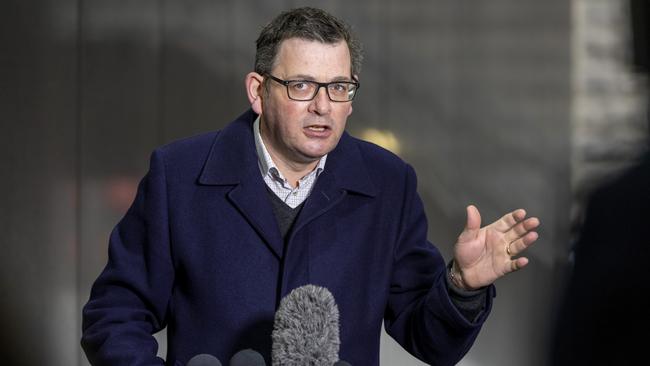
Sharri Markson, Yoni Bashan 10.40pm:Lib revolt on mandatory vaccines for workers
Premier Gladys Berejiklian faces a backlash from conservative Liberals objecting to her move to make vaccinations a mandatory condition of employment for tradies and construction workers.
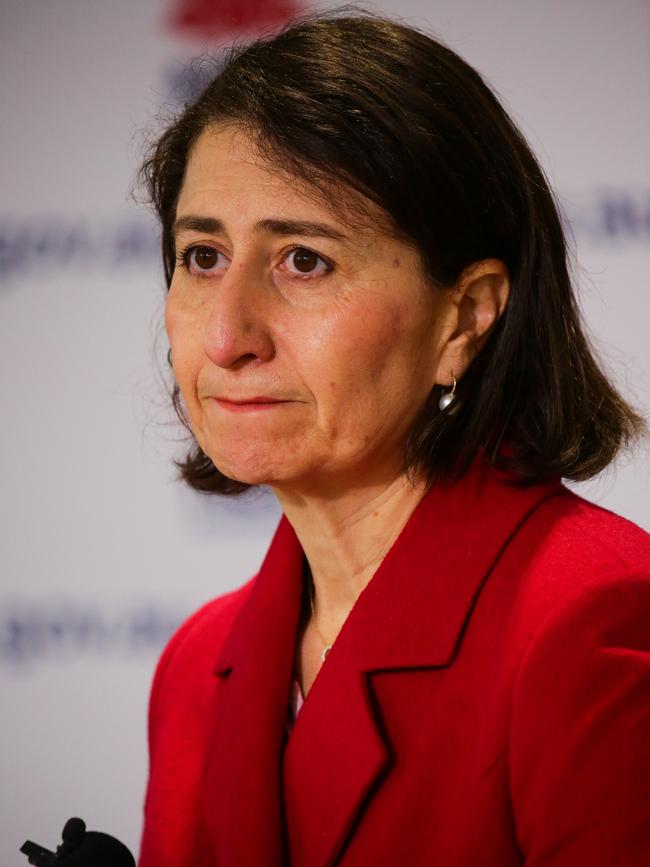
NSW Liberal backbencher Tanya Davies will introduce a private member’s bill that seeks to ban companies, or the state government, from forcing employees to get a Covid-19 jab. It has the support of cabinet minister Anthony Roberts and other Liberals.
It comes as businesses globally make vaccinations a requirement of employment, and CNN reportedly sacking three employees who came to work unvaccinated.
Ms Davies said the policy of compulsory vaccination was “an attack on my community and the people of NSW”.
“No person should lose their job if they do not get vaccinated,” Ms Davies said. “They may not want to be vaccinated for medical, ethical or religious reasons and we should be protecting people’s individual rights and circumstances.”
The conservative MP, whose electorate of Mulgoa is in western Sydney, said her private member’s bill reflected concern within her community and the Liberal Party.
Helen Trinca 10pm: ‘All options on table’ for jab passport
NSW has called for a national approach to protect businesses that try to force employees and customers to be vaccinated against Covid-19.
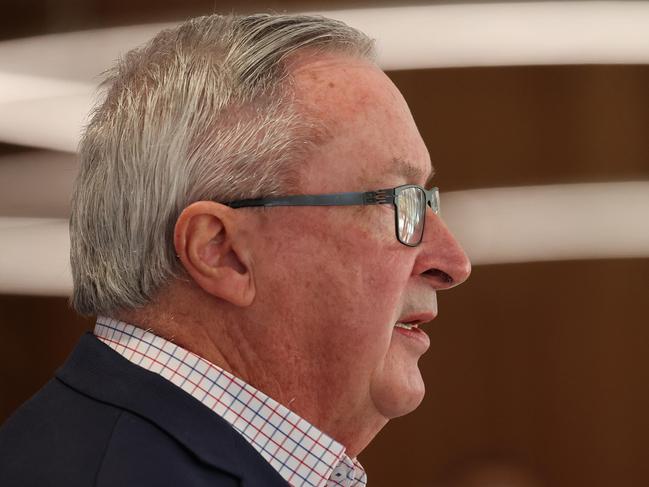
Health Minister Brad Hazzard said on Sunday that while it was possible he could use state public health orders to override privacy legislation and allow disclosure of a person’s vaccination status, the federal government should take the lead at this stage.
The reach of the federal Privacy Act is central to whether a “vaccination passport” can be enforced by retailers and other companies and whether employers can require staff to reveal if they have had a jab.
Along with the Fair Work Act, the privacy legislation is problematic for companies trying to decide if they can compel people to be vaccinated.
The federal government says business must make the running on the issue but companies are desperate for more support.
While some sectors are considering following food processor SPC and making vaccination a condition of employment, other companies could consider asking staff if they have been vaccinated.
The problem is that under the Privacy Act, no one has to disclose vaccination status.
Stephen Rice 9.15pm: Vaccination levels pave way back to work
NSW is on track to hit six million vaccinations by the end of the month – enough to ease restrictions on work and schools by September, according to the road map out of lockdown touted by the Berejiklian government.
With 4.4 million jabs administered in NSW, the Premier insisted on Sunday that some restrictions could be eased at a threshold of 50 to 60 per cent of the population vaccinated – much lower than the 70 to 80 per cent target set by the Doherty Institute modelling for the federal government released last week.
But Gladys Berejiklian denied suggestions her targets were at odds with Scott Morrison’s, saying that the federal target applied to pre-lockdown level restrictions.
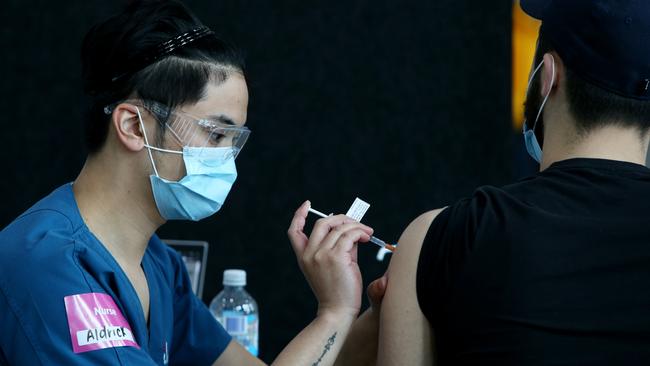
Jess Malcolm 8.30pm: Student vax booking system glitches rife
The Berejiklian government’s vaccination drive for Year 12 students in hotspot areas is being derailed by booking system glitches and last-minute transport disruptions, sparking concerns the mass immunisation of 24,000 students could take much longer than the six days scheduled.
With students’ return to school in time for HSC examinations hinging on high levels of vaccination rates, health authorities have been scrambling to execute priority vaccination for students in eight local government areas from Monday.
But the rollout to students has already been marred by technical glitches that have seen students waiting on the site for hours unable to book a vaccine, reporting the system has been rejecting their personal information or simply crashing. Others say they are still waiting to receive the link to book a jab even though they are part of the eligible group.
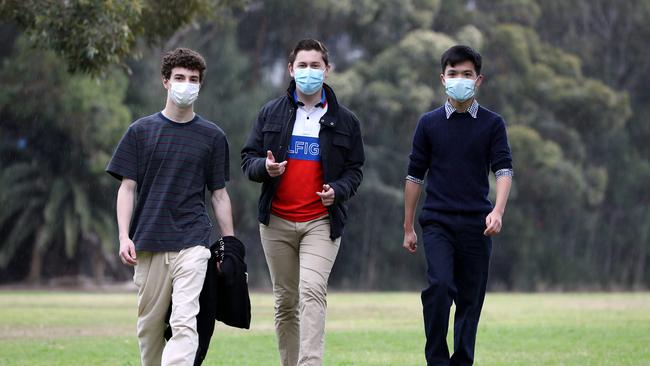
Liam Mendes7.45pm:Pfizer fizzer sends jab hopefuls home in disgust
More than 200 people who turned up for a “Super Sunday” vaccination blitz at Sydney Olympic Park thought they would be getting Pfizer jabs – but left in anger when they discovered they were being offered only AstraZeneca.
Queues formed early for the 5000 doses of vaccine set aside for cafe, restaurant, catering and supermarket workers after NSW Health Minister Brad Hazzard promoted the “special day”, for those people to come and get jabbed.
But many who turned up felt they had been misled, with health officials bearing the brunt of their anger.
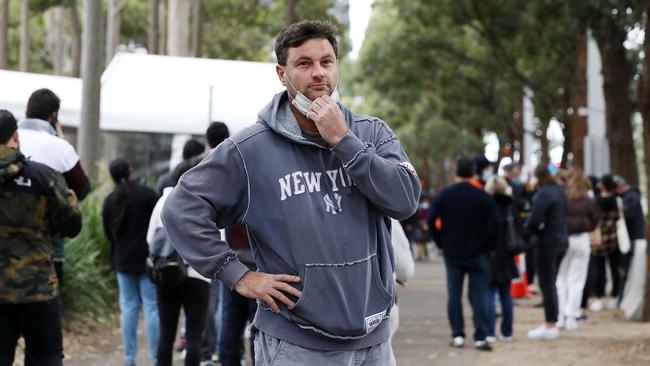
Mackenzie Scott7pm:Lockdowns buoy strong auction results
Lockdowns dealt a blow to auction numbers last week, helping to underpin the strong clearance rates.
Last week saw the country’s three largest cities – Sydney, Melbourne and Brisbane – end the week in lockdown following continued Covid-19 outbreaks.
As a result, the number of properties taken to auction fell week-on-week to 1672 auctions, with preliminary data from researcher CoreLogic finding just over three quarters (76.4 per cent) sold.
While final numbers are not expected until later in the week, early data shows 10 per cent of properties originally scheduled for auction last week were rescheduled to a later date.
CoreLogic’s research executive Tim Lawless said the high levels of properties sold prior and withdrawals suggested vendor confidence might be waning.
“That really says to me that if vendors were super confident, they would be selling under the hammer and testing the market,” Mr Lawless said.
“But it looks like they’re much more willing to accept that offer beforehand if it’s reasonable, and no doubt there is still some good offers coming in as this is still a really tight seller’s market.”
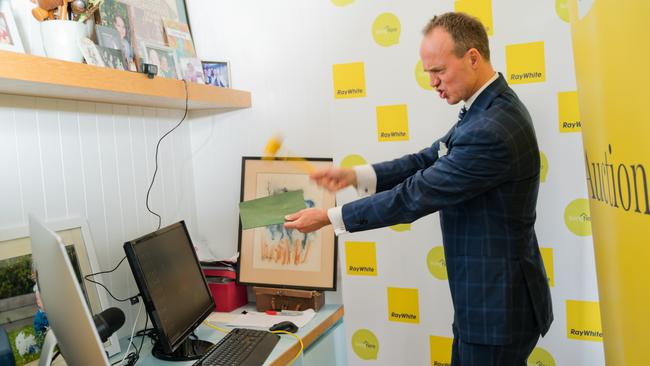
Paul Garvey 6.15pm: Extra medics, beds to ease strain on health
Western Australia will pump almost $2bn of extra funding into its health system as it looks to ease the strain that has plagued its hospitals in recent months.
Premier Mark McGowan and Health Minister Roger Cook on Sunday pledged to deliver another 332 hospital beds – including 109 mental-health beds – and promised to recruit 100 new doctors and 500 new nurses.
The government also promised another $88m for additional nursing and administration staff at the Perth Children’s Hospital. The death of seven-year-old Aishwarya Aswath at the hospital earlier this year, after she waited almost two hours for help, prompted a public outcry and exposed shortcomings in the hospital’s practices.
Ambulance ramping levels have also hit unprecedented highs this year, peaking at 5246 hours in June, and have consistently been at multiples of the 1030 hours-per-month level that Mr Cook described as a “crisis” when he was in opposition.
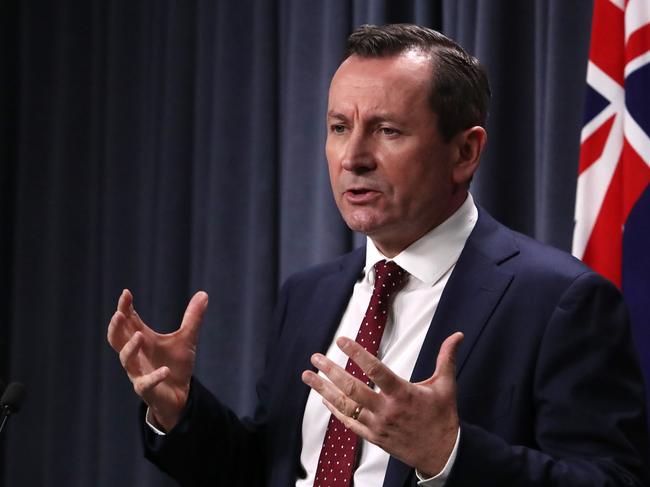
The government has been under mounting pressure in recent months to use its growing budget surplus – the product of record-high royalty revenues from the state’s iron ore industry – to improve its health system.
Mr McGowan said the extra spending on staffing levels and infrastructure in the health system were the result of his government’s financial management.
The strain in the health system in recent months has come despite WA being largely untouched by the pandemic. While the feared hospitalisations due to Covid-19 have not materialised in WA, the closure of international borders has cut off the supply of foreign doctors and nurses that underpinned the health system.
Mr Cook said international studies had shown the pandemic had deterred people from engaging with GPs and hospitals last year, which had led to an increase in the frequency and acuity of hospital presentations this year.
“Every health minister in Australia is feeling the heat from dealing with Covid and dealing with the unprecedented demand on our hospitals,” he said.
“We are very fortunate in Western Australia that we have managed the state’s finances properly and as a result of that we are able to put significant investment as part of the budget process to try to address the situation.”
AFP5.30pm: Brunei clamps down after first local cases in 15 months
Brunei has imposed strict curbs to halt the spread of Covid-19, after finding its first locally transmitted cases in the country in over a year.
Seven community infections were found, the health ministry said, leading the government to close all places of worship and postpone social events for two weeks.
Mass events were also limited to groups of 30 people over this period as school classes were moved online and restaurants barred from serving dine-in.
The tiny Islamic sultanate has largely remained coronavirus free, logging only three deaths since the pandemic began.
More than half of its 347 infections so far were imported, with tight border controls and quarantine measures keeping the virus’s spread in check.
Five of the oil-rich nation first local infections since May last year were linked to a government-run virus monitoring centre.
“This cluster is believed to likely have been exposed to one of the imported cases in Brunei,” the ministry said in a statement.
The source of infection for the other two could not be identified, the ministry added.
An imported case was also announced Saturday: a man who arrived from the Middle East via Malaysia on July 30 before experiencing symptoms on Tuesday.
Brunei has been spared the serious coronavirus outbreaks that are overwhelming health systems in much of Southeast Asia.
It shares its only land border with Malaysia, which has recorded nearly 1.25 million infections and more than 10,000 deaths.
The country has also been steadily ramping up its vaccination process, with nearly 32 per cent of its 450,000 people getting at least one jab
READ MORE:China exposed amid questions over whether its jabs work
Rebecca Le May4.50pm:Hunt confirms third vaccine option for Aussies nears
The Therapeutic Goods Administration is on track to approve the Moderna Covid-19 vaccine within a fortnight, giving Australians a third option to Pfizer and Astra Zeneca, Health Minister Greg Hunt has confirmed.
Mr Hunt told reporters on Sunday it was expected the first million doses would be available next month.
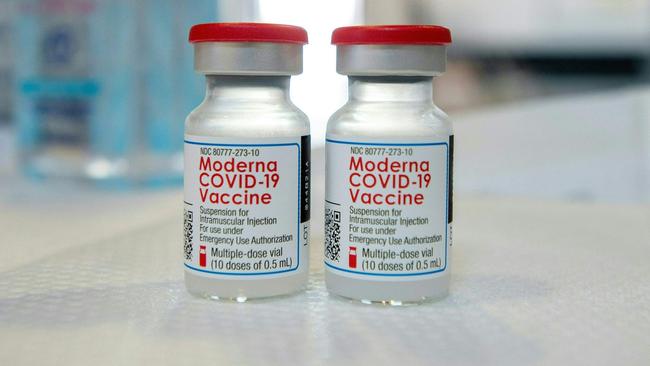
A further three million doses would be supplied each month through October, November and December, he said, although consignment dates had not yet been provided by the company.
Mr Hunt said Australians were rolling up their sleeves in record numbers.
“We see that the hesitancy is down and the intention to vaccinate is up,” he said.
Intention to get the jab was at 77 per cent, the minister said.
Weekly vaccination rates had nearly doubled from 700,000 a month and a half ago to almost 1.3 million over the past seven days, Mr Hunt said.
READ MORE:Norman blasts Biden over vaccine
Agencies4.30pm:Counting the coronavirus cost at Tokyo’s Olympics
The pandemic affected almost every part of Tokyo’s Olympics, forcing a historic postponement, the banning of almost all spectators, and ending the dreams of more than a few athletes.
As the Games wrap up, how did virus concerns play out during the pandemic Olympics.
How many cases were there?
From July 1 to Sunday, the final day of the Games, Tokyo 2020 says it identified 430 positive cases in a population of 52,000 overseas participants and athletes and many more Japanese volunteers and security.
Most positive cases were among residents of Japan, largely staff or contractors, with 29 athletes and 25 members of the media also testing positive.
There was one so-called “cluster”, in the Greek artistic swimming team. All 12 members went into isolation in the second week of the Games after five members tested positive.
Outside the Olympic bubble, Japan hit new virus records, with the capital accounting for a large portion of the numbers.
Cases were already on the rise before the Games, and Tokyo has been under a state of emergency for weeks.
Did the virus affect events?
Virus regulations meant athletes who tested positive could not continue in the Games.
And some saw their Olympic journey end even before it began. Former US Open winner Bryson DeChambeau and tennis star Coco Gauff tested positive before setting out for the Games.
And others like Chilean taekwondo athlete Fernanda Aguirre were ruled out after a positive test at the airport.
Some athletes were already on the ground and training when they got the news, including US pole vaulter Sam Kendricks, who withdrew from the Games.
But the cases had no major effect on events, with none cancelled or moved as a result.
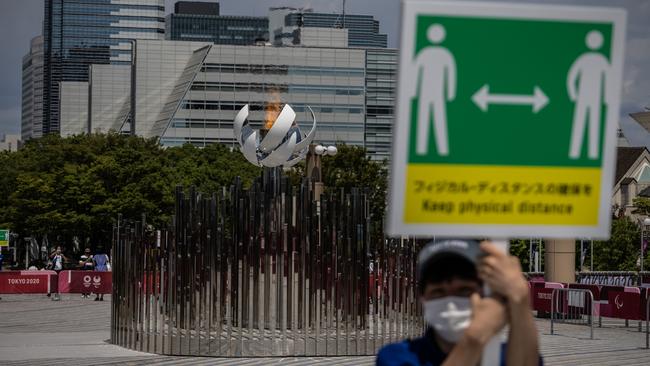
How did teams react?
There was little outcry from teams forced to withdraw athletes from competition. But the rules around isolation for those testing positive did cause some controversy.
Members of the Dutch team in hotel quarantine went on “strike” over a lack of fresh air in the rooms, winning 15 minutes a day at an open window.
Dutch taekwondo fighter Reshmie Oogink described the quarantine as “Olympic jail”.
Did the ‘bubble’ hold?
For the most part, teams stuck to the rules and got on with their sport. But there were a few notable exceptions.
Members of the Georgian judo team had their Olympic passes removed after an unauthorised sightseeing trip.
And five members of Australia’s mens hockey team were reprimanded for breaking out of the bubble to buy beer.
But organisers said overall the rules were respected and the comparatively low number of cases in the Olympic Village were “a very successful outcome,” said Brian McCloskey, a member of the expert panel advising the IOC on virus measures.
Organisers also denied any connection to rising virus cases in Tokyo, and the city’s governor even argued the Games helped people keep at home to watch on TV.
Some experts argue there was an “indirect relationship” and that holding the Games undermined the government’s messaging on virus risks.
AFP
READ MORE:From Tokyo, with love: The stars we couldn’t resist
Agencies4.00pm:Data dynamo’s ‘digital twins’ aiming to tame Covid
“When you turn on the news, you just see queues: queues for vaccination, queues for tests. I see data.”
From her office in Brisbane, Dr Kellie Nuttall’s job is to build solutions to wicked problems and Covid-19 ticks the box.
A digital native still in her 30s, Nuttall is one of Deloitte Australia’s youngest partners, promoted under chief executive Adam Powick’s leadership and now the artificial intelligence lead for the firm. For the past nine years, she has been knee-deep in big data analytics and artificial intelligence and more recently data-rich virtual models known as “digital twins”. She says these will give Australia a much-needed boost to get ahead of the curve in the pandemic.
“I see data. I see supply and demand issues that are just waiting to be optimised,” Nuttall tells The Australian.
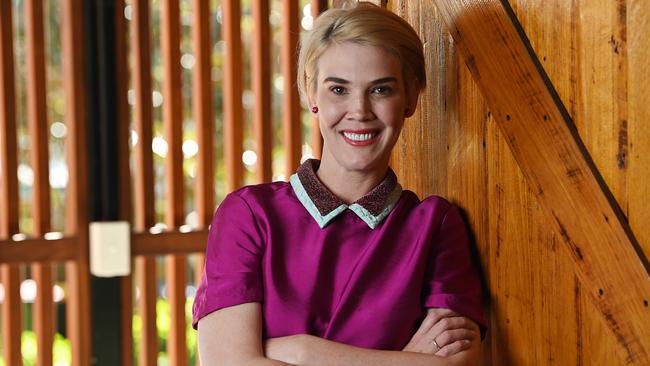
“Imagine looking at that vaccination and testing system as a whole. We could build the digital twin of it, and we can quickly see where we have supply and where we have demand issues and how we optimise that system. The digital twins can tell us where tomorrow’s bottlenecks are likely to be before they have even occurred. That’s how we can reduce pressure on the system,” she says.
Digital twins use data to understand fiendishly complex and ever-changing environments.
Vast amounts of data are combined to create a complete digital copy of the environment, which could be a company or a community.
Twins have explored space, made cities smarter, optimised manufacturing systems and generated renewable energy more efficiently.
“There are answers in the data but you need to know what questions to ask of that twin,” Nuttall says.
“What twins are really effective at doing is scenario testing. In a pandemic, I believe that can be extremely effective in helping us test a range of scenarios very quickly to shape an optimal response.”
In Australia, there’s a wealth of lazy data at our disposal.
READ the full story
Philip Sherwell3.30pm: China outbreak deepens vaccine effectiveness doubts
China has long trumpeted its success in stamping out coronavirus cases at home and distributing vaccines abroad as proof of its superiority over the West.
Now those claims are coming under unprecedented scrutiny as Beijing scrambles to contain China’s worst outbreak for more than a year by placing millions under lockdown and ordering mass testing in cities with infections.
As in many other countries the highly transmissible Delta variant has up-ended previous calculations.
For the first time some Chinese public health experts are suggesting that the country may need to contemplate a dramatic shift in its approach: away from “zero tolerance” of infections and towards a “living with Covid” strategy.
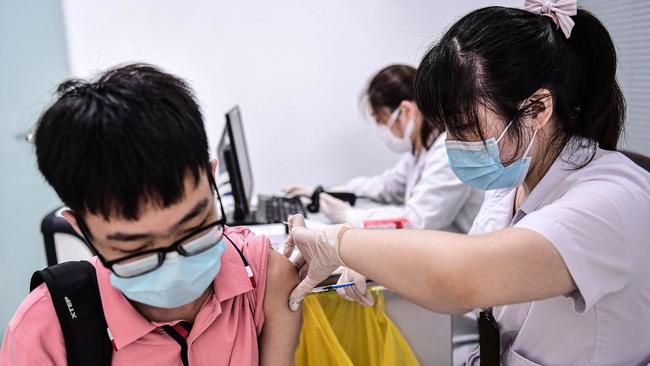
The new wave has deepened existing doubts about the effectiveness of Chinese vaccines against new variants even as President Xi Jinping last week announced that China would supply two billion doses of its vaccines for global use, the latest broadside in an aggressive vaccine diplomacy campaign.
The new outbreak is understood to have started with the arrival of a passenger with the Delta variant on a flight from Russia in the eastern city of Nanjing on July 10. It was spread by aircraft cleaners who were infected after a breakdown in safety protocols. By yesterday, there had been more than 1,500 new confirmed cases since mid-July - and hundreds more asymptomatic ones, which China does not include in tallies.
READ the full story
Ellen Ransley3.05pm:Woman charged with fleeing Qld quarantine
A woman has been charged with multiple offences after she allegedly fled her Gold Coast hotel quarantine room.
Queensland Police said the 24-year-old had travelled to the Sunshine State from New South Wales when she was picked up at a border control checkpoint last Saturday.
She was transported to hotel quarantine, but on Tuesday allegedly forced open the glass door of her room and absconded.
She allegedly remained on the run until Saturday, when she was found at Centenary Lakes Park in Caboolture, more than a 100km from where she was last seen.
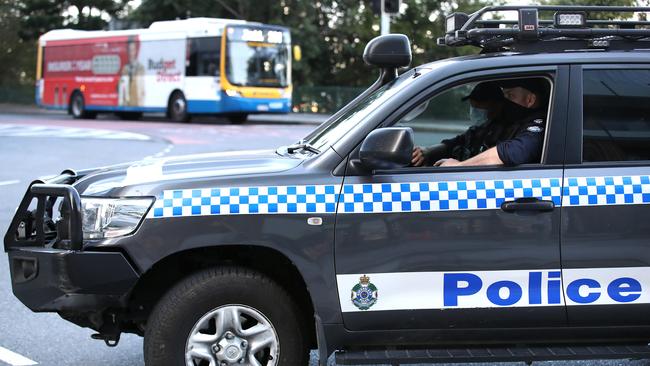
She was taken into custody and later charged with one count each of fail to comply with Covid-19 direction, wilful damage and stealing, and two counts of breach of bail in relation to other matters.
Deputy Commissioner Steve Gollschewski said she would remain in custody while she completed her quarantine.
The woman was denied bail and will appear in Brisbane Magistrates Court via video link on Monday.
READ MORE:Australia ‘seriously divided but not dangerously divided’
Agencies2.40pm:Unvaccinated twice as likely to get Covid re-infection
Unvaccinated people are more than twice as likely to be reinfected with Covid-19 as the fully vaccinated, a study by the Centers for Disease Control and Prevention said.
The agency said the finding supports its recommendation “that all eligible persons be offered Covid-19 vaccination, regardless of previous SARS-CoV-2 infection status.” Some US politicians, including Senator Rand Paul, have in the past said they do not plan to take a Covid-19 vaccine because of their natural immunity derived from prior infection.
The new study was based on 246 Kentucky adults who were reinfected in May and June this year after previously being infected in 2020.
A new @CDCMMWR finds that people who did not receive #COVID19 vaccine after having COVID-19 were more likely to get COVID-19 again. People who previously had COVID-19 should get a COVID-19 vaccine to reduce their risk of getting COVID-19 again. Read more: https://t.co/KZwEEefv6D. pic.twitter.com/4612c0jYcR
— CDC (@CDCgov) August 6, 2021
They were compared with 492 “controls” who were matched by sex, age, and time of initial positive test.
The analysis found that unvaccinated people were 2.34 times as likely to be reinfected compared to people fully vaccinated with the Pfizer, Moderna or Johnson & Johnson vaccines.
The duration of infection-acquired immunity remains poorly understood and may be affected by the emergency of newer variants, the paper said.
For example, laboratory studies have shown that blood samples from people previously infected with the original Wuhan strain had poor antibody responses to the Beta variant first identified in South Africa.
One of the limitations of the study is it was conducted before Delta became the dominant strain in the United States.ia/ft
AFP
READ MORE:US broadcaster dismisses three unvaccinated staff
Ellen Ransley2.20pm:What you can and can’t do in Qld post lockdown
Southeast Queenslanders will be released from lockdown on Sunday afternoon, but will need to follow strict rules for at least two weeks.
Premier Annastacia Palaszczuk said it was important residents of the 11 local government areas that spent the past eight days in lockdown recognised they were “not out of the woods yet”.
For the next 14 days, high school students will be required to wear masks at school.
“For all our high school students, please, I need you to wear masks, because you’ll be helping to keep the whole community safe,” Ms Palaszczuk said.
“Because we have the Delta strain, and until we can get to those 70 and 80 per cent of vaccination rates, masks are absolutely critical.”
Other rules that will come into place at 4pm Sunday include a maximum of 10 people inside homes.
“You are able to go and visit your loved ones in hospital and aged care, but of course you can’t do that if you are subject to a home quarantine order,” Ms Palaszczuk said.
Queensland’s roadmap for easing restrictions has been updated.
— Annastacia Palaszczuk (@AnnastaciaMP) August 8, 2021
Here's everything you need to know about the changes commencing 4pm today, 8 August. pic.twitter.com/hgzPDTb8qw
Weddings and funerals will be capped at 20 people.
Places of worship, convention centres, retail, hospitality, gyms, hairdressers, beauty and personal care venues will all reopen, but the one person per four square metre restrictions will come back into force.
Community sports will not be permitted over the next two weeks.
Ms Palaszczuk stressed that masks would continue to be “really important” and would need to be worn widely.
She said those living in southeast Queensland could travel within that area, but now was “not the time” to be travelling to regional parts of the state.
“Please, put off plans to visit family and friends in regional Queensland for the next two weeks,” she said.
READ MORE:Infected taxi driver triggers fresh Queensland lockdown
Evin Priest2.00pm:The restrictions NSW will ease first
A return to school and to work is slated for Greater Sydney residents if New South Wales can hit a total of 6 million doses of Covid-19 vaccinations by August 28.
The race is on to get another 1.6 million jabs in arms during the next three weeks after the state reached 4.4 million jabs.
“Pleasingly, New South Wales has now made sure that there are 4.4 million jabs in arms. That is positive,” Premier Gladys Berejiklian said.
“This is a race. We are tracking well to hit our 6 million target (of at least one dose).
“I am keen to get to 6 million jabs by the end of August because that will provide us opportunities to consider what life looks like in September.”
On Sunday, NSW recorded 262 new locally acquired cases and at least 50 were active in the community while infectious.
A woman with the virus died overnight, bringing the number of Covid-related deaths during the current outbreak to 28.
Health officials confirmed the woman, aged in her 80s, was a resident at the Wyoming Residential Aged Care Facility in Summer Hill, which is at the centre of an outbreak, and died at Royal Prince Alfred Hospital.
Ms Berejiklian and health officials insist not only will the amount of Covid-19 deaths be reduced if NSW can get to 6 million jabs, but two restrictions could be eased.
“Our priorities as a government are getting face-to-face learning back, but also getting workers back to the workplaces,” Ms Berejiklian said.
“If certain categories of workers go back to work, it also means all citizens will perhaps have access to services they don’t have access to (currently).”
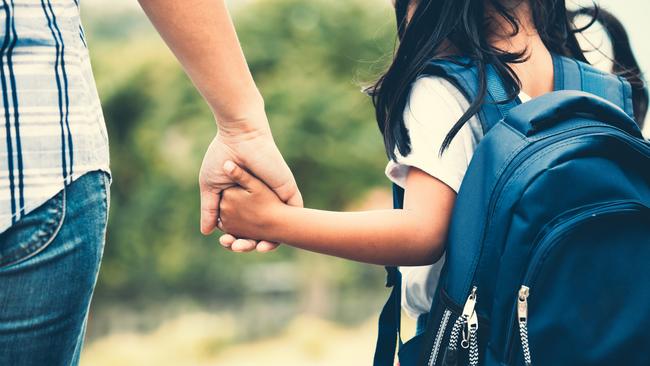
Students will be only able to return to school on Monday if their school is not in a high-risk local government area (LGA), while a public health order prevents workers from attending offices unless they are essential workers.
For suburbs in Greater Sydney that are not in high-risk LGAs, the allowed reasons to leave home are:
• Shopping for food or other essential goods and service (within 10kms of home)
• Medical care or compassionate needs, including getting a Covid-19 vaccine
• Exercise outdoors in groups of two (within 10km)
• Essential work or education where you cannot work or study from home
However, people who live in the LGAs of Penrith, Blacktown, Campbelltown, Canterbury-Bankstown, Cumberland, Fairfield, GeorgesRiver, Liverpool and Parramatta can only leave home to:
• Obtain food or other goods and services (within 5km)
• For work if you cannot reasonably work from home and your workplace is in the same local government or if you are an authorisedworker
• Education if it cannot be done at home
• Exercise (within 5km)
• Medical care, including obtaining a COVID-19 vaccination
Another incentive for NSW residents to get the jab is a growing number of people hospitalised with the virus.
There are currently 362 cases in hospital, with 58 people in intensive care, 24 of whom require ventilation.
There were 95,480 Covid tests in NSW in the 24 hours to 8pm on Saturday as well as 20,612 vaccinations.
READ MORE:The timebomb ticking under lockdowns
Michael McKenna1.27pm:Campbell Newman returns to politics with swipe at PM
Former Queensland premier Campbell Newman is returning to politics, running for a senate spot for the Liberal Democrats at the next federal election.
Just weeks after quitting the Liberal National Party, Mr Newman on Sunday announced he would be leading the Queensland senate campaign ticket for the Liberal Democrats.
Mr Newman said he had been approached to run by a number of minor parties, including Clive Palmer’s party and One Nation.
Despite being ousted from government and his seat after just a single term in state politics, Mr Newman said he felt compelled to return to politics, accusing the Morrison government of an abject failure with its vaccination rollout.
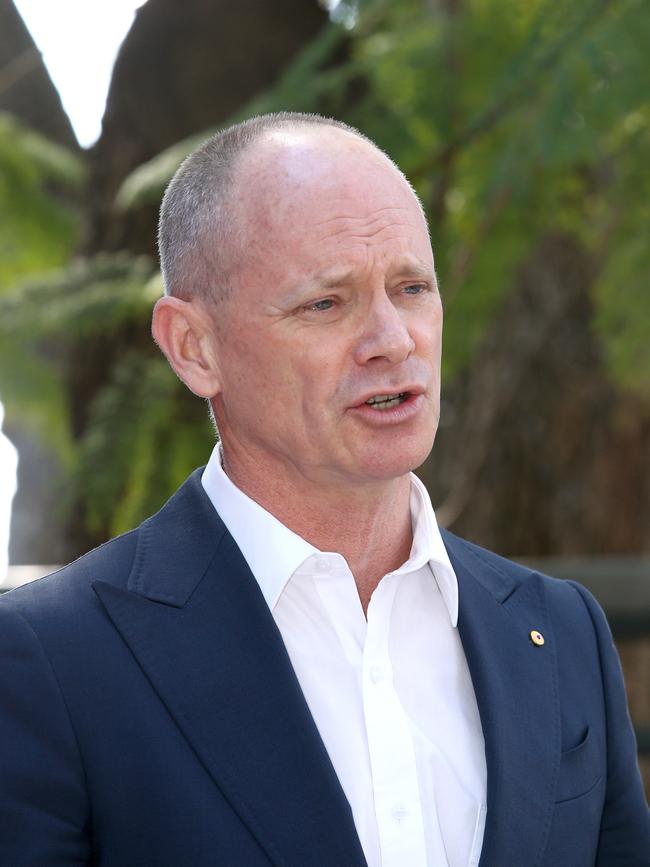
Mr Newman also criticised the Palaszczuk’s Governments mounting lode and the burden on business of Covid-related restrictions over the past 18 months, while conceding the latest lockdown was necessary because of the threat of the Delta variant and low vaccination rates.
“Six years ago, I declared my political career over. But I simply cannot sit by and watch Australia being so poorly led, and this crisis being so poorly managed, by our major political parties,’’ he said.
“I love Australia and I love Queensland. I want to represent Queensland in the Senate and hold the major parties’ feet to the fire, because right now they are all seriously letting us down.’’
Read the full story here.
Jess Malcolm1.04pm:NSW Health issues more venue alerts
NSW Health has issued a fresh public health alert for more venues exposed to Covid-19 after the state recorded 262 new cases on Sunday.
Anyone who has been to the following venues is now considered a close contact and must get tested and isolate for 14 days.
Thursday July 29
Nextra Newsagency, Charlestown from 3.15pm to 3.22pm and 4.18pm to 4.24pm
Barber Industries, Kotara from 1.30pm to 2.00pm
Friday August 6
Ampol Service Station, 41 Minmi Road, Maryland from 4.30am to 10am
READ MORE:Shark blasts Biden for failing to provide Australia with jabs
Rebecca Urban12.18am:Victoria to offer AZ to 18-39 year olds
Victoria will be offering AstraZeneca shots to 18 to 39-year-olds as part of a push to boost vaccination rates.
Premier Daniel Andrews announced that nine of the 50 open-access state-run clinics would have 200,000 doses designated for young people from next week.
He said that he anticipated sites would be busy.
“A lot has been written and said about vaccine hesitancy,” he said. “That’s not what I’m picking up on.”
Mr Andrews urged Victorians aged 18 to 39 to book to be vaccinated.
“It’s critical to us being open and staying open.”
The state also announced the first drive-through vaccination site, which will be open for bookings from Monday.
A former Bunnings warehouse at Melton has been converted for the purpose.
“Today we’re announcing the soft launch of Australia’s first drive-through vaccination clinic,” Victorian Acting Covid Commander Naomi Bromley said.
“You book, you drive up, roll down your window, roll up your sleeve, get a jab, it’s that easy.
“It is has been planned very carefully in line with advice that ATAGI has provided about what a drive-through vaccine model looks like.”
READ MORE:Fortress Australia will look higher, faster, stronger
Jess Malcolm11.43am:Berejiklian flags restrictions easing by September
Gladys Berejiklian has denied suggestions her vaccination targets are at odds with the Prime Minister, flagging that some restrictions could be eased if NSW reaches six million doses by September.
The NSW Premier said some restrictions could be eased at a threshold of 50 to 60 per cent, a much lower target than Doherty Institute modelling for the commonwealth released last week which set a 70 to 80 per cent target.
“We are currently in lockdown, and lockdown plus some level of easing of restrictions is possible once we get to 50 or 60 per cent rates of vaccination,” she said.
“The Prime Minister said publicly... that because New South Wales is in lockdown, if we hit certain vaccination targets we can ease some restrictions.
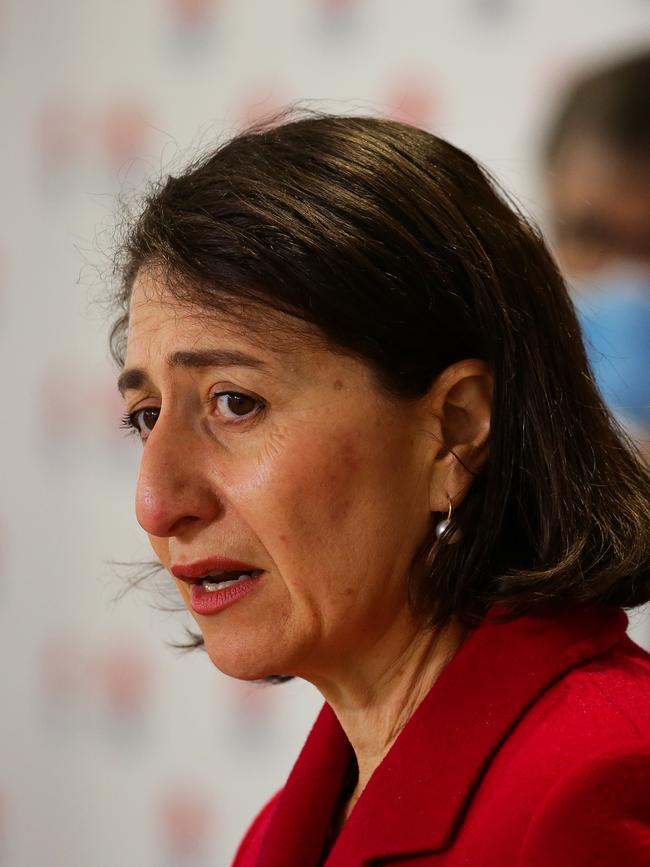
“It doesn’t mean you get to what you would ease if you are 70 per cent, but there are certainly opportunities for us to look at what we can ease in September, so long as we hit our
vaccination targets, we can look for opportunities as to how we live in the month of September.”
Ms Berejiklian said NSW Health experts had been carefully observing how other countries such as Canada had eased restrictions with higher vaccination rates.
READ MORE:Chris Kenny — All proportion lost in the fear race
Jess Malcolm11.25am:NSW ‘on track to hit vaccination target’
Gladys Berejiklian has urged people to listen to health professionals amid growing concerns of widespread misinformation about vaccines.
The NSW Premier has urged people to get vaccinated and said there were a wide range of places for people to come forward to get vaccinated, including GPs, pharmacies, mass vaccination hubs and mobile clinics.
“Speak to your GP, your pharmacist, a community leader, who has provided you with information,” she said.
“We have targeted grassroots information to so many diverse communities. Over 200 different communities of diverse backgrounds, in greater western Sydney, something our state is very proud of, but also something we need to acknowledge.”
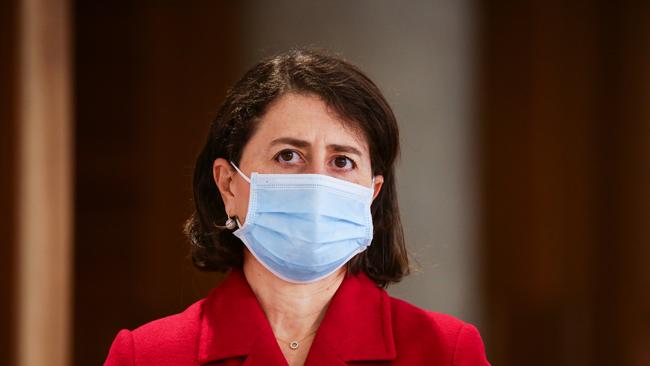
Ms Berejiklian also urged all essential workers to get vaccinated as soon as possible, but foreshadowed the state was “on track” to hit its six million-dose target.
“What it does mean is that September can be a month where we have greater freedom than we do now,” she said.
“Freedom relies on vaccination, and there is no doubt about that, but it also means having to suppress the virus.”
READ MORE: Terry McCrann — The timebomb ticking under lockdowns
Jess Malcolm11.02am:NSW records 262 new cases, one more death
NSW has recorded 262 new cases of Covid in the past 24 hours, with residents in the Penrith local government area to be subject to tougher restrictions from today.
A woman in her 80s also died overnight. She was a resident of a Summer Hill aged care home.
“Regrettably, there are 12 suburbs in the Penrith local government area that will now be listed as an area of concern and will be subjected to those harsher restrictions,” Premier Gladys Berejiklian said, citing fears of cases spreading from eight other LGA hotspots bordering Penrith.
“We want to make sure that we stem the tide of the virus seeping into those additional communities and we ask residence from five o’clock this afternoon to adhere to the additional restrictions placed upon them.”
Those suburbs are Caddens, Claremont Meadows, Colyton, Erskine Park, Kemps Creek, Kingswood, Mount Vernon, North St Marys, Orchard Hills, Oxley Park, St Clair, and St Mary’s.
“In line with restrictions currently in place in Blacktown, Campbelltown, Canterbury-Bankstown, Cumberland, Fairfield, Georges River, Liverpool and Parramatta LGAs, people in those 12 suburbs must only obtain food and other goods and services and exercise 5km from their home,” NSW Health’s Dr Jeremy McAnulty said.
“You cannot travel to other areas of work outside those areas unless you are an authorised worker. Masks must be worn whenever you are outdoors, except in a common outdoor area of a backyard, apartment, for example.”
The woman’s death overnight brings the total number of deaths in the latest outbreak to 28.
There are now 362 cases in hospital, with 58 in intensive care and 24 cases are ventilated.
Of the 58 cases in intensive care, five are in their 20s, seven in their 30s, four in their 40s, 17 in their 50s, seven in their 60s, 15 in their 70s and three in their 80s.
Dr McAnulty said young people are at serious risk of illness from Covid-19 and urged all people to get vaccinated.
“So young people are certainly getting caught up with this disease,” he said.
“With the 58 people in ICU, 54 were not vaccinated, three had received their first dose of AstraZeneca and one had received their first dose of Pfizer vaccine.”
More to come...
Mackenzie Scott, Jess Malcolm10.03am:Qld records nine new cases, Cairns in lockdown
Lockdown will end in Queensland for 11 local government areas in the state’s south east at 4pm today, but an infected taxi driver has triggered a snap, three-day lockdown in Cairns.
The state has recorded nine new cases of Covid, with concern emerging over the taxi driver, who was infectious in the community for 10 days.
Seven of today’s cases are locally acquired and linked to the Indooroopilly cluster. Another case on the Gold Coast is still under investigation.
“Unfortunately, this discovery of a positive case in Cairns is something that we were not expecting, and we really need the residence of Cairns to come forward with any symptoms and get tested,” Premier Annastacia Palaszczuk has told a press conference.
“So, from 4pm today, for the next three days, Cairns and Yaribah will go into a lockdown. It is essentially a lockdown that the 11 LGAs went to, but they will be allowed to have up to two visitors to come and visit their homes. We need more testing in Cairns. I am very concerned.”
It is unclear if the infection is linked to a fully vaccinated reef pilot who tested positive last week.
While lockdown will lift at 4pm for 11 LGAs stretching from the Gold to Sunshine coasts, some restrictions will remain.
People will now be able to leave their homes and schools will reopen, and visits in hospitals and aged care are now allowed.
But several restrictions remain, including mask wearing for all high school students and primary school staff at schools.
Weddings and funerals will be capped at 20 people, and places of worship, convention centres, retail, dining, gyms and beauty services will operate at 50 per cent capacity.
People will only also be able to have 10 people in their homes.
Ms Palaszcuk has also advised people not to travel into regional Queensland, confirming the state was “not out of the woods.”
More to come …
Christine Kellett9.55am:Queensland Premier addresses the media | WATCH
Annastacia Palazszcuk will hold her first daily Covid press conference in weeks after leaving hotel quarantine this morning.
The Queensland Premier has been out of action after returning from Tokyo for the Olympic Games, will update the media at 10am, and is expected to announce whether a circuit-breaker lockdown will be lifted in southeast Queensland later today as planned.
Health authorities yesterday said the lockdown easing would depend on today’s daily infection number.
Max Maddison9.45am:Hunt tight-lipped on Gladys’ reopening plan
Health Minister Greg Hunt has refused to say whether NSW Premier Gladys Berejiklian will rescind lockdown restrictions before the state gets to 70 per cent, despite the intention being in clear contradiction to modelling conducted by the Doherty Institute.
Ms Berejiklian has stated she will begin to ease draconian public health orders once NSW reaches 50 per cent vaccination coverage. The figure, however, stands in stark contrast to the federal government’s own modelling which showed the effective threshold was significantly higher.
When pressed on the issue, despite saying he had recently spoken to NSW chief health officer Kerry Chant, Mr Hunt declined to say whether the state intended on breaking away from the rest of the country to carve their own path.
“What I can say is clear, David, is that they are committed to defeating COVID,” Mr Hunt told ABC’s Insiders on Sunday morning. “That’s what I can say is clear, and as to the way in which they’re doing it, one of the things which is really important is to continue to provide support for the public”
Should NSW relax restrictions at a 50% vaccination rate of the eligible population or 70% per Doherty Institue modelling?
— Insiders ABC (@InsidersABC) August 7, 2021
"You are asking me to make a decision on behalf of others," @GregHuntMP says.#Insiders#auspolpic.twitter.com/6Whbz4X637
He added that children were likely to begin receiving vaccinations in the “last quarter” of this year.
Mr Hunt also sought to stem speculations that federal chief medical officer Paul Kelly was publicly calling for tougher measures in NSW, saying he was merely encouraging people to comply with existing restrictions.
“To continue to move to suppression, it is about encouraging people to stay home, it is about the compliance which comes with the additional positive support of the Australian Defence Force,” he said.
READ MORE:Sydney, where ‘no one seems clear on the rules’
Ellen Ransley9.37am:Qld teachers, FIFO workers jab priority
Queensland teachers and FIFO workers have become priorities for the state’s vaccination rollout amid the Delta outbreak.
School staff and childcare workers have been added to the state’s 1B priority list, as well as fly-in-fly-out, freight and distribution centre workers.
More than a hundred cases are now linked to southeast Queensland’s Delta cluster, which began when a high school student somehow contracted the virus last month.
It spread to a number of students, staff and family members at Indooroopilly State High School, Ironside State School, Brisbane Girls Grammar and Brisbane Grammar.
Premier Annastacia Palaszczuk said the reason for adding school and childcare workers was because of how much of an impact the latest outbreak had had on educational facilities.
“We need to provide the best possible protection for staff and students,” she said.
“This strain of the virus moves incredibly quickly, and we need to be just as fast in our response.”
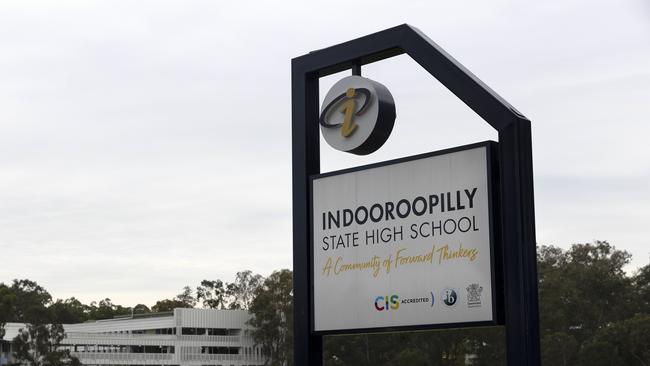
Ms Palaszczuk said the changes to the state’s vaccine rollout, “coupled with the remarkable work of Queenslanders during this lockdown” would bolster the state’s efforts to get out on top of the latest outbreak.
Education Minister Grace Grace, said she hoped staff in all schools and childcare centres across Queensland would take up the offer of vaccination.
“I would urge any eligible worker who has not yet been vaccinated to jump online and register,” she said.
“I am also asking schools to be as flexible as possible when it comes to assisting staff to access leave to attend their vaccination appointments.”
To date, Queensland has administered more than 2.5 million doses of the Covid-19 vaccine.
Anyone who works at a school or childcare centre is included in the eligible 1B group, including childcare educators, teachers, teacher aides, management and administrative staff, groundskeepers, cleaners, locum staff, regular volunteers, and any other ancillary school and early learning support staff.
READ MORE:In Brisbane, ‘we’ve learnt to follow orders well’
Max Maddison9.15am:Vaccine still a struggle for non-English speakers
Opposition communications spokeswoman Michelle Rowland says it remains a “real struggle” for people from non-English speaking backgrounds to get information about vaccinations, as she laments the long-term damage school closures may have on students.
A record day of case numbers in Greater Sydney was set to climb higher on Sunday, as outbreaks in Newcastle, Melbourne and Brisbane left the eastern seaboard of the country under strict lockdown orders.
Premiers are racing to vaccinate a sufficient proportion of their population, but Ms Rowland said there remained insufficient vaccine information for some culturally diverse communities, which was undermining attempts to mitigate vaccination hesitancy.
“I think that there has been a real struggle here for people of non-English speaking backgrounds to get information about Covid Safety, let alone about vaccination,” she told Sky News on Sunday morning.
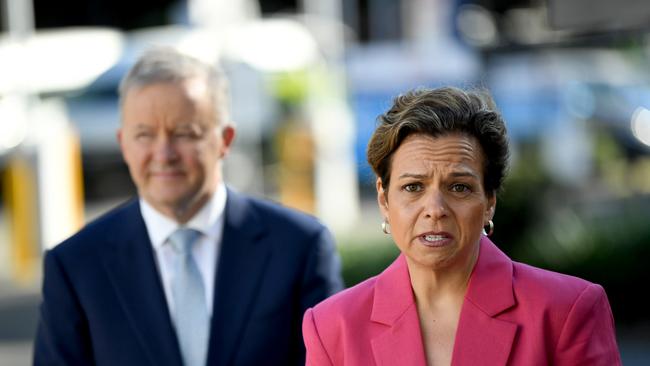
“When you go to the vaccination checker, you can get information in Icelandic, but you can’t get information in Tamil. And I have one of the highest proportions of Tamil speakers in all of Australia in my electorate.”
She also expressed concern that ongoing school closures, forcing kids into home learning, would have unforeseen consequences further down the track.
“Part of it is wondering what impact this is going to have on them in the long term, again, with no end dates to remote schooling inside at the moment,” she said.
READ MORE:Students are suffering as gates remain shut
Max Maddison8.54am:States ‘reserving their rights on reopening’
Employment Minister Stuart Robert has refrained from criticising NSW Premier Gladys Berejiklian, despite her plans to plough ahead with reopening at odds with the Morrison government’s own modelling.
Amid rising infections across Greater Sydney, including an outbreak in Newcastle, Ms Berejiklian has changed her milestone from case numbers to jabs, flagging her intention to begin easing restrictions at the end of August, once 50 per cent of the NSW population is vaccinated.
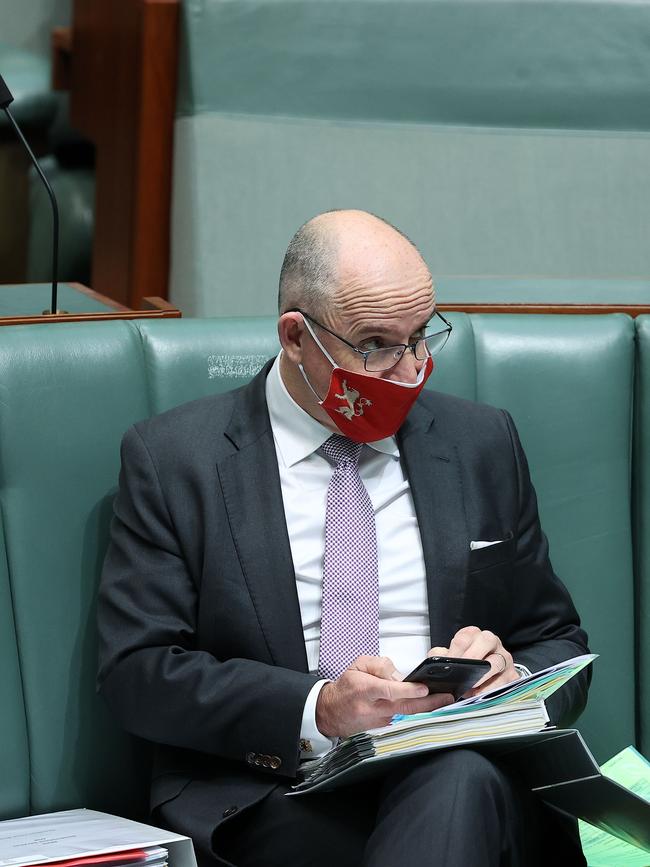
But despite the figure being considerably lower than modelling conducted by the Doherty Institute, which pointed to 70 per cent as the key metric for easing restrictions, Mr Roberts refused to question the plan.
“States have always reserved their rights on a whole range of issues — we’ve seen that consistently. But we’ve also seen the simple message: phase one, let’s get 70 per cent of the population vaccinated,” Mr Robets told Sky News on Sunday morning.
READ MORE:Optimist-in-chief can feel animal spirits rising
Angelica Snowden8.38am:Victoria records 11 new cases
Victoria has recorded 11 new local cases of coronavirus in 24 hours, from more than 38,000 tests.
That’s down from a high of 29 cases on Saturday.
All 11 cases were out in the community during their infectious period, authorities say.
The cases have all been linked to current outbreaks
Reported yesterday: 11 new local cases and 2 new cases acquired overseas (currently in HQ).
— VicGovDH (@VicGovDH) August 7, 2021
- 17,360 vaccine doses were administered
- 38,179 test results were received
More later: https://t.co/lIUrl1hf3W#COVID19Vic#COVID19VicData [1/2] pic.twitter.com/um9ZSa7MjF
There are a further two cases that have been recorded in hotel quarantine.
Yesterday’s 29 cases — the highest daily rise this year — has thrown the end of lockdown number six into doubt on Thursday.
All 29 cases yesterday were also in the community during their infectious period and Premier Daniel Andrews said mystery cases were behind two outbreaks in Hobson’s Bay and Maribyrnong.
More to come …
Max Maddison8.20am:Moderna set to be given the green light
Ten million Modern jabs will soon be given the green light, with the Therapeutic Goods Administration set to approve the vaccine as early as next week.
Senior federal government sources told The Daily Telegraph that the drugs regulator was set to approve Moderna within a fortnight, opening the door for the first 300,000 doses to hit Australia’s shores in September. It will become the third vaccine in the Morrison government’s arsenal.
The country has another three million doses scheduled from October until December.
The highly effective mRNA vaccine’s arrival in Australia comes with over half the country suffering through ongoing lockdowns. The Morrison government is under intense pressure for the perceived failure to procure enough vaccines, with mixed messaging undermining the rollout of AstraZeneca.
With vaccine demand rising amid the most serious outbreak since the start of the pandemic, Health Minister Greg Hunt said more than 200,000 vaccinations had taken place over each of the preceding five days, and pointed to declining vaccine hesitancy in the community.
“What we do know is that the capacity is now fully established to deliver over two million doses per week of AZ plus Pfizer and Moderna, as supplies become available,” he told The Daily Telegraph.
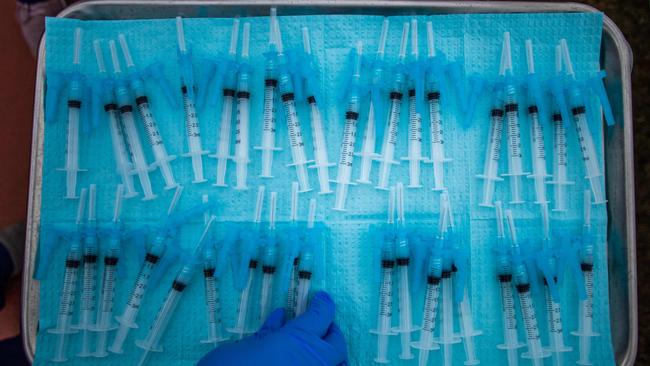
“As the Pfizer numbers grow from one to two million per week, and as Moderna grows to 700,000 per week, we will be able to deliver well over two million doses per week if there is demand.”
The Morrison government has also procured almost 8000 doses of Sotrovimab, a monoclonal antibody treatment, used to treatment Covid-19 patients with mild symptoms who are at high risk of developing severe symptoms.
Trials for the treatment have shown it dramatically reduces hospitalisation and death among unvaccinated Covid patients.
READ MORE: In Brisbane ‘we’ve learned to follow the rules well’
Mathew Murphy, Angie Raphael7.30am:Victoria adds dozens of new exposure sites
Victoria has added dozens of new exposure sites amid news the state’s lockdown looks set to be extended.
Victoria’s Department of Health issued a late-night alert for a number of exposure sites, classified as Tier 1.
Anyone who has visited a Tier 1 exposure site during the times listed must immediately isolate, get a covid test and quarantine for 14 days from the date of exposure.
CAROLINE SPRINGS
• Woolworths – August 5 between 10:15pm and 12:55pm
• BWS – August 2 between 9am and 10am, August 3 between 5:10pm to 8:40pm, August 4 between 8:30am and 5:30pm, August 5 between 8:30am and 12:45pm
• Pacific Smiles Dental – CS Square, 29 Lake Street, August 4 between 5:32pm – 6:05pm
TAYLORS LAKES
• BWS – August 4 between 6:20pm and 7:10pm
YALLAMBIE
• Drysdale Street North East Link Project Worksite, Borlase Reserve
August 2 between 10:15am – 4pm, August 3 between 7:30am-4pm, August 4 between 9am-2:30pm
It comes after news of an outbreak of the Delta strain of Covid-19 has spread to a Melbourne public housing tower, which has joined a growing list of public exposure sites.
Read the latest exposure site list here.
Agencies 6.40am:Protesters mass in France against Covid health pass
Almost a quarter of a million people took to the streets across France on Saturday for the biggest protests yet against a coronavirus health pass needed to enter a cafe or travel on an inter-city train, two days before the new rules come into force.
Similar but smaller protests were held in Italy.
Championed by President Emmanuel Macron, the French regulations make it obligatory to have either a full course of vaccination against Covid-19, a negative test or be recently recovered from the virus to enjoy routine activities.
Macron, who faces re-election next year, hopes to encourage all French to be vaccinated against Covid-19 and thereby defeat the virus and its fast-spreading Delta variant.
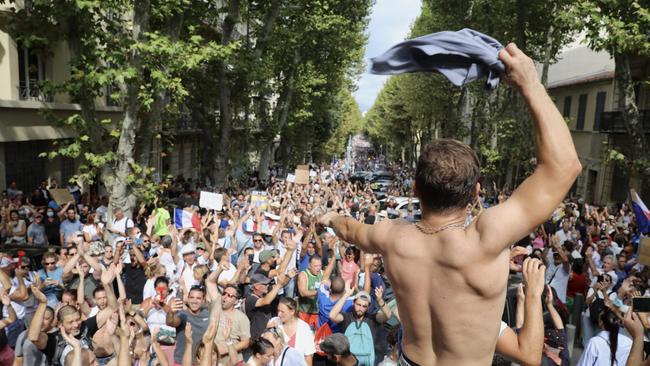
But opponents — who have now held four weekends of consecutive protests — argue the rules encroach on civil liberties in a country where individual freedom is highly prized.
About 237,000 people turned out across France, including 17,000 in Paris, the interior ministry said, exceeding the 204,000 recorded last weekend -— unusual numbers for protests at the height of the summer break.
In one of several protests in Paris, hundreds marched from the western suburbs to the centre, chanting “Freedom!” and “Macron, we don’t want your pass!”.
Wearing a mask, Alexandre Fourez, 34, said he was protesting for the first time and that he had himself recovered from Covid.
“The problem with the health pass is that our hand is being forced,” said the marketing employee, adding he “really has difficulty believing its use will be temporary”.
READ MORE:Covid reveals howour political class has failed us
Mathew Murphy, Angie Raphael6am: NSW issues urgent, late-night exposure alert
NSW Health has issued a late-night alert for new Covid exposure sites as the state recorded five deaths and 319 new locally acquired cases.
Anyone who attended the following venues is considered a close contact, who must get tested and isolate for 14 days, regardless of the result:
CALLAGHAN
• International House (any block), Callaghan Campus, University of Newcastle, University Drive, Wednesday 28 July – Saturday 7 August, All Day.
PENRITH
• Terry White Pharmacy, 447 High Street, Wednesday 4 August, 7:50am to 6pm, Tuesday 3 August, 7:50am to 6pm
• JANS Family Health Practice, 447 High Street, Wednesday 4 August, 7:50am to 6pm, Tuesday 3 August, 7:50am to 6pm
ST MARYS
• St Marys Medical Centre, 53 Phillip Street, Wednesday 4 August, 9:15am to 10am
MARYLANDS
• Ampol Maryland, 41 Minmi Road, Friday 6 August, 4:30am to 10am
CHARLESTOWN
• Nextra Newsagency, Charlestown Square, Pearson Street, Thursday 29 July, 3:15pm to 3:22pm, Thursday 29 July 2021, 4:18pm to 4:24pm
KOTARA
• Barber Industries, Westfield Kotara, 75-89 Park Avenue, Thursday 5 August, 1:30pm to 2pm
It came after a physiotherapy centre and a Commonwealth Bank branch were added to the exposure list.
NSW Health advises anyone who attended the following venues is considered a close contact, who must get tested and isolate for 14 days, regardless of the result:
BELMORE
- Belmore Physiotherapy and Sports Injury Centre, 372 Burwood Rd, August 3 from 1pm to 5.30pm.
BURWOOD
- Commonwealth Bank, 116 Burwood Rd, August 3 from 8.15am to 5.15pm and August 4 from 8.15am to 5.15pm.
- Anyone who travelled on the following train service is also considered a close contact:
- XPT REGIONAL TRAIN
- From Broadmeadow to Armidale via Werris Creek, July 29 from 11.40am to 5.30pm.
- Earlier on Saturday, authorities also listed the John Hunter Hospital emergency department in New Lambton Heights as an exposure site from 8.42pm on Thursday to 1.50am on Friday.
- NSW Health sends a text message to people who have checked in at close contact venues with further information.
- “We also make a follow-up call to close contacts to discuss the isolation and testing requirements,” NSW Health said.
âš ï¸PUBLIC HEALTH ALERT – NEW VENUES OF CONCERNâš ï¸
— NSW Health (@NSWHealth) August 7, 2021
NSW Health has been notified of a number of new venues of concern associated with confirmed cases of COVID 19. pic.twitter.com/FOulcpx6Ur
READ MORE: More cases ‘a certainty’ in Victoria
Rhiannon Down5am:NSW government resists harsher lockdown
The NSW Opposition says it would support tougher lockdown measures to try to reign in the state’s spiralling Covid crisis, after 319 new cases on Saturday marked the state’s darkest day this year.
But the Berejiklian government is resisting pressure to come down harder on Greater Sydney, despite NSW Health Minister Brad Hazzard revealing a third of Saturday’s new cases were out and about in the community while infectious. Instead, he said the responsibility remained with people to do the right thing.
“We are satisfied that the orders in place are appropriate,” Mr Hazzard told Nine newspapers, saying the state already had in place the “toughest lockdown in the country at the present time.”
“The real problem remains: it doesn’t matter what orders you put in place if people ignore them.”
Five more deaths – including three linked to a ballooning cluster at Liverpool Hospital’s geriatric ward sparked by an infected nurse – have pushed the death toll from this outbreak to 27, with authorities citing a growing number of young people left desperately ill with Delta and requiring ventilation in intensive care.
Meanwhile, a new epicentre of the virus is emerging in the Canterbury-Bankstown local government area. Mr Hazzard said general compliance with public health orders as well as the region’s reliance on manufacturing and distribution industries were behind the spread there.
“The NSW government must hold to the strategy of bringing community transmission to zero or close to zero,” Labor leader Chris Minns told The Daily Telegraph. “If the CHO and NSW government think that more measures are needed, NSW Labor will support them.”
More than 340 people are now in hospital in NSW with coronavirus, 56 of them in intensive care. Of those, four are in their 20s, four are in their 30s, and three are in their 40s. So this disease is infecting people of all ages,” Deputy Chief Health Officer Jeremy McAnulty said on Saturday.
“Of the 56 people in ICU, 51 were not vaccinated at all, four had received the first to dose of AstraZeneca vaccine, and one has received the first dose of the Pfizer vaccines.”
Premier Gladys Berejiklian was criticised on social media for not attending Saturday’s press conference, instead leaving it to Mr Hazzard, who announced the 319 figure and a seven-day lockdown in regional Armidale after cases were detected there.
âš ï¸PUBLIC HEALTH ALERT – NEW VENUES OF CONCERNâš ï¸
— NSW Health (@NSWHealth) August 7, 2021
NSW Health has been notified of a number of new venues of concern associated with confirmed cases of COVID 19. pic.twitter.com/wl5tDH4Bvu
Mitch Clarke4.45am:Victoria’s lockdown to be extended beyond seven days
Victoria’s sixth lockdown is set to be extended past Thursday after the state recorded its worst day of cases in almost a year.
The Sunday Herald Sun was told by senior government sources on Saturday night that hopes of coming out of lockdown later this week are fading fast.
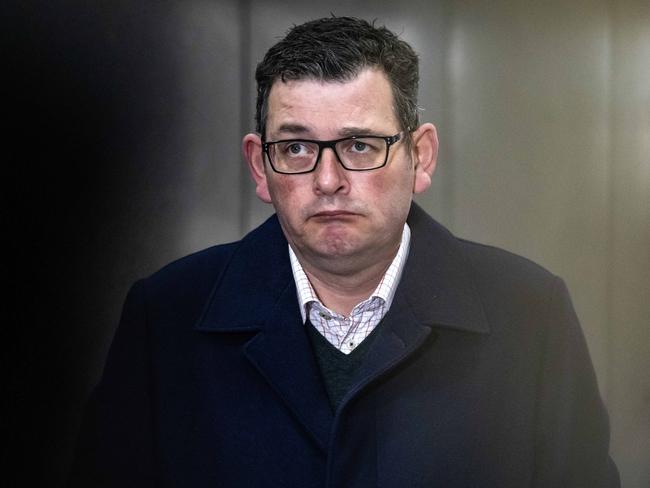
It is believed fears are mounting within the government that contact tracers will be unable to identify and connect all cases in the community in time for the lockdown to end as planned.
The state government is expected to announce details about an expanded vaccination program – including for younger people and key workers such as teachers – in the coming days.
Leading epidemiologists on Saturday said they expected the Victorian lockdown to be extended after the state recorded 29 cases – the highest daily case number since last September.
Premier Daniel Andrews has warned that more infections were likely to be discovered in the community.
Read more at The Sunday Herald Sun.
Cormac Pearson4.30am:Minister’s plea with Queensland on ‘knife edge’
Queensland health minister Yvette D’Ath has called on Queenslanders not to “undo all the hard work” after footage showed people mingling at a popular market in Brisbane this morning.
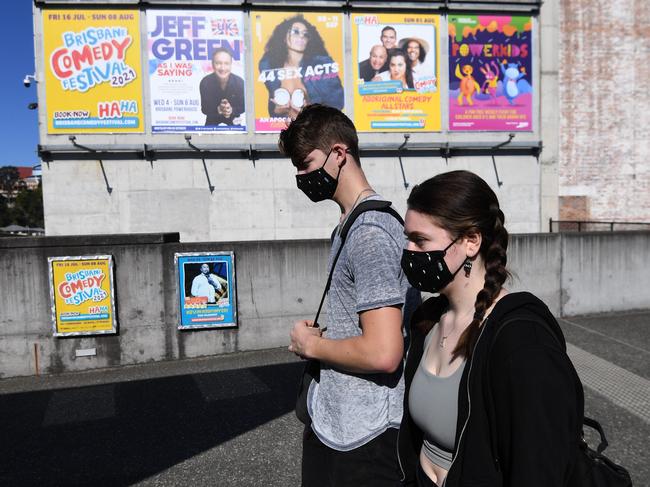
Footage showed groups of people sitting together at the Jan Powers Farmers Markets at Brisbane Powerhouse in New Farm which is classified as essential, with some seemingly without masks.
“With southeast Queensland on a knife-edge, we’re asking everyone to stay home and not leave their front door unless it’s absolutely necessary,” Ms D’Ath said.
“Now is not the time to undo all our great work, and eating out at the markets can probably wait.
“The purpose of allowing food stalls is for people to get essential groceries or takeaway food.
“If you go out, mask-up and socially distance – that’s what will get us through this.”
People took to social media in anger at the scenes with a decision on the end of the lockdown looming on Sunday.

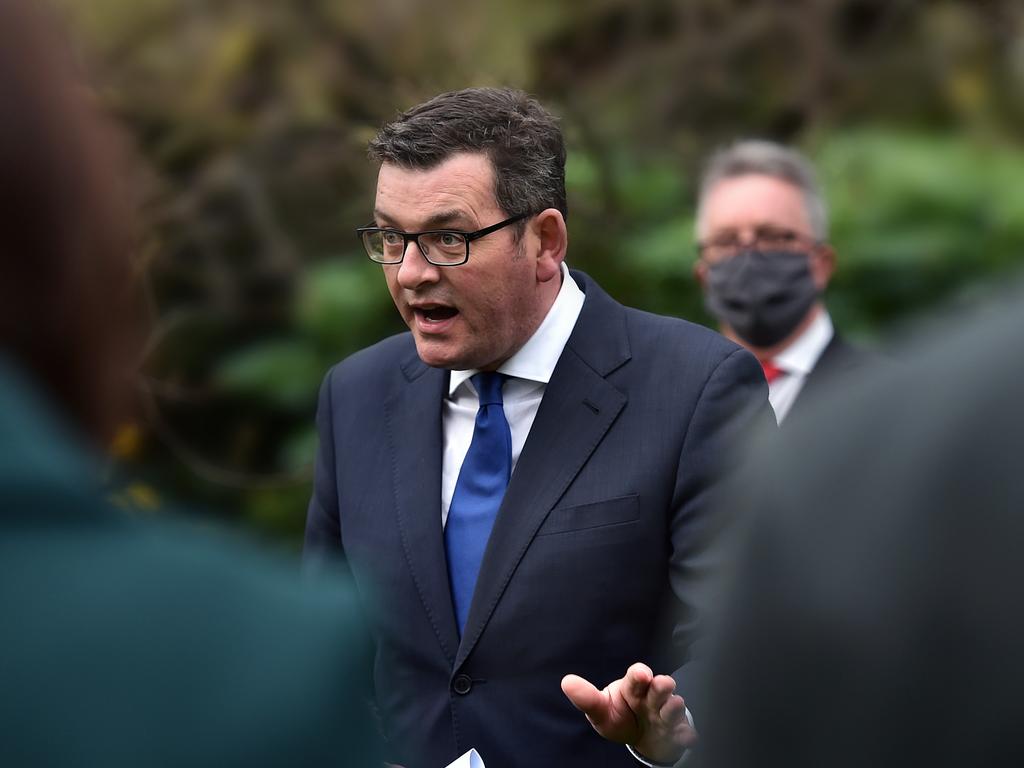


To join the conversation, please log in. Don't have an account? Register
Join the conversation, you are commenting as Logout